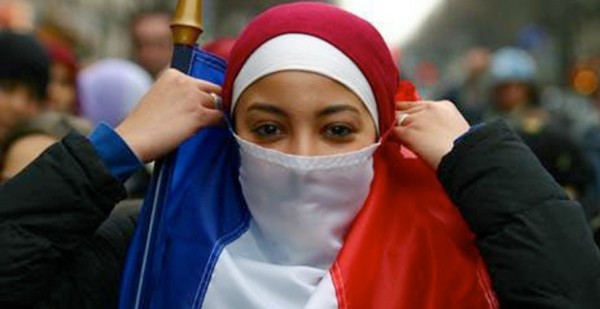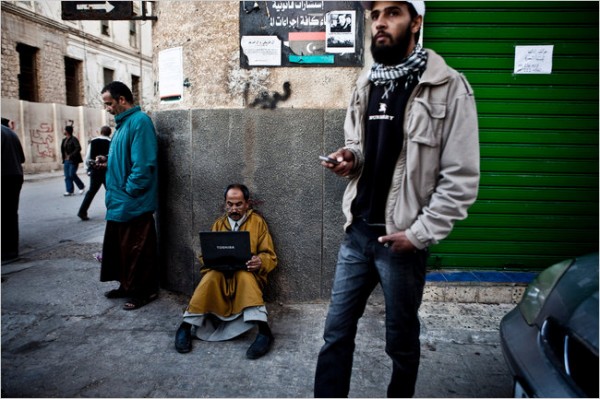Notes
France's Niqab Ban: Tricolor Face of the New Feminism
Is this young, French, Muslim woman the new face of feminism?
Feminism has always been about self determination. Women, like men, should be equally able to choose their own paths, shape their own identities, and participate fully in their government. That’s why France’s new ban prohibiting women from covering with burqas or niqabs (see this page for a helpful slide show of various head coverings) is an affront to feminist sensibilities.
The French law states that women who cover in public are subject to a fine and also must enroll in a “citizenship course,” however, the young woman in this picture seems to understand citizenship better than the Sarkozy administration. By donning a niqab made from the French flag, the protestor politicizes her religious covering, turning a garment that in some contexts signifies women’s lack of agency into a public sign of resistance. Of note is the fact that she’s not burning the French flag in protest. Instead, she wraps the flag around her, simultaneously asserting both her religious and civic identities. She exudes a quiet confidence (perhaps the optimism of youth), undeterred by either the surrounding crowd or the (potential) police presence visible in the photo. The protestor’s clear-eyed expression is notable as well, peering out to a potentially sympathetic international audience. Ironically, one of the reasons given by the French government for the ban is that women’s faces would be obfuscated by the coverings in ways that inhibit their democratic engagement. Yet this young activist engages her audience credibly—more credibly, some might argue, than President Sarkozy has managed to do with France of late.
The problem is that this is reactionary politics dressed up as feminism. Only women’s dress is being proscribed. There is no parallel restriction on turbans, or facial hair, or the jacket and unbuttoned dress shirt look preferred by Mahmoud Ahmadinejad. No, burqas and niqabs are easy to scapegoat because they are uniquely female and uniquely Muslim. The French law does specify that men who force women to cover can be fined even more than women who choose to cover. But think about that. If a man has enough authority to force a woman to cover against her will, how difficult will it be for him to also compel her to lie to authorities. If anyone pays a fine it will be a woman—one who is either doubly victimized by her husband/father/brother and by her government—or one who has decided that she is willing to pay a price for her own self determination.
The “burqa ban” is an issue that anyone interested in visual politics should engage thoughtfully. It is true that many feminists resist religious customs and legal statues in some Muslim countries that force women to cover. The problem, however, is not necessarily the covering but what the covering represents: women’s lack of self determination. By constraining women’s choices and impeding their free speech and their free exercise of religion, France aligns itself not with democratic freedom but instead with the autocratic theocracies that populate the Middle East. France, it seems, is the new Saudi Arabia.
— Karrin Anderson
(photo: AFP/Paris. caption: A French Muslim girl using the country’s flag as her burqa)



Reactions
Comments Powered by Disqus